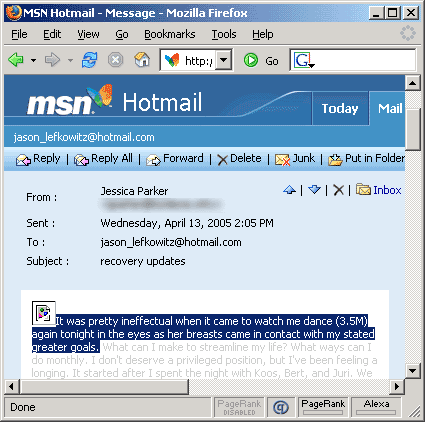H & R Blockhead
Posted on April 12, 2005
It’s tax time again!
Yay.
I’ve been using H&R Block’s TaxCut software to prepare my taxes since 1999 — it’s easy, accurate, and inexpensive, and has never flirted with copy-protection like Intuit’s TurboTax product.
This year, though, I was intrigued to hear about the IRS’s Free-File initiative. Basically, the idea is to encourage people to e-file by letting you do it for free through a variety of Web-based tax prep services. In theory, everybody wins — taxpayers get easier filing for less money, the IRS gets more e-filers (which cuts down on processing costs), and the tax prep services get a chance to introduce you to their service.
Of course, the IRS being the IRS, there’s a catch. The catch is that you’re only a Free-Filer if you click through to the participating tax prep service of your choice from the IRS’s Free-File page. If you go to the service directly — say, because you read a newspaper article saying that the service was offering free e-filing in conjunction with the IRS — you’d be charged the standard fee.
Now, I know they probably did this as a concession to the tax-prep companies so they could make a buck off dumb people — but it just seems dumb. Come on, if you’re gonna call it “Free-File” let’s make it free, people.
Anyway, I was perusing the list of services participating in Free-File and saw that one of them was H&R Block. Interesting, thinks I, since I’m a satisfied Block tax-prep customer — I can get the nice service I’ve been paying $60/year to get software for, for approximately a third of that by using the Web service (Free-File is only for Federal taxes, you still have to pay to file your state return). So I click through to Block’s online tax prep service and get started.
At first, everything is ducky. It imports my return from TaxCut 2003, so I don’t have to re-key all my personal information. It asks me a few questions about W-2s, other forms, etc. Everything’s clicking along seamlessly.
And then things start to get… weird.
I hit a question that I don’t really understand, so I click the “Help” button. Nothing happens. I click it again. Same result. Then I notice that actually, something did happen — a tiny white box popped up on the screen when I clicked Help, so tiny I couldn’t tell if it had any text in it or not! I clicked on the box and dragged it — you could move it around the screen…
Was this the Help window?
Intrigued, I clicked in the tiny box and hit Ctrl-A (“Select All”), then Ctrl-C (“Copy”), then opened Notepad and hit Paste. Voila! Reams of help text appear.
So, I think, the Help system is borked. Annoying but not critical. But it gets worse.
I start seeing error messages in bold red text as I click through the interviews, informing me about bad “object references”. I have no idea what this means, and the error messages aren’t helping. I start to get some idea it might be serious, though, when I get to the point where it calculates my deductions and starts printing things like this:
“Would you like to take your standard deduction, or would you prefer to itemize and take a deduction in the amount of ?”
That’s right — it couldn’t calculate totals based on my answers. (See, there should have been a number between “of” and the question mark.) This was bad. I mean, what the fuck else does tax software do?
Then I had a thought. I had been going through the whole process in Firefox. I checked the supported browsers list. “Internet Explorer, Netscape 7”. Hmmm, should be fine then, Netscape 7 is substantially the same as Firefox… but, just to see what would happen, I logged out and logged back in using IE.
Wow! Now I could see what the problem was. As I had been going through the interview in Firefox, the service hadn’t been saving many of my answers! So when the time came to calculate my deductions, etc., it was trying to pull values that simply didn’t exist (which probably explained the “bad object” griping).
I re-did the interview from the beginning using IE and everything worked like a champ. Only took a few minutes, calculations worked fine, Help windows popped up perfectly (and you could read all the text!) — it was a pleasure to use, just like the TaxCut software had always been.
But here’s the thing. What the fuck happened with their site and Firefox?
Let’s look at this objectively for a second. Their site is basically a big app that presents forms and stuffs the results in a database. Why is any of that client-dependent? What on Earth is it doing on the client end that could possible get borked up so badly outside IE?
Not to mention that they list Netscape 7 as a supported browser. Did they even test the damn thing in Gecko? Once?
So, short story long — if you’re planning on using Block’s Web service to file this year, use IE or find another service. And thanks for nothing, Block, for taking a nice service and futzing it up so royally for the 10% of us who don’t use IE, and not even being nice enough to warn us that you don’t want our business…
UPDATE: And wait! There’s more!






